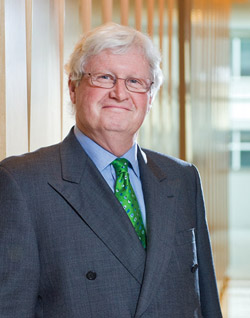Where the Action Is

Mark Tuohey: Members can lend a hand. (Photo by David Fonda)
When it comes to legislative advocacy on Capitol Hill, the ABA’s most effective resource is its own members. The ABA Governmental Affairs Office, which includes a team of registered lobbyists, coordinates the association’s advocacy efforts with Congress.
But the GAO relies heavily on a network of ABA members who bring the association’s views to the attention of individual legislators through personal contacts.
Members of that network—called the Grassroots Action Team—are well-positioned to tell members of Congress how proposed legislation will affect the legal profession and the public because they are working on the front lines of the justice system as practicing lawyers and community leaders.
“The influence in Washington of the ABA, and state and local bar associations, does not stem from political action contributions or political organizing efforts at the federal level. We do not engage in either activity,” says Thomas M. Susman, director of the Governmental Affairs Office. “Instead, the association leverages the collective experience and expertise of the highest-quality legal minds to bring to the table a depth of skills that makes the contribution of ABA members invaluable to government decision-makers.”
Close collaboration between the GAO’s staff lobbyists and members of the Grassroots Action Team produced some notable victories for the ABA during the 111th Congress, which is coming to a close. Lawyers will, for instance, be excluded from additional federal regulation in the new financial regulatory reform law. In addition, Congress increased funding for the Legal Services Corp., which channels funding to local offices that provide civil legal services to poor people. Congress also increased funding for indigent defense programs. The new health care reform law contains provisions the ABA sought in the areas of elder justice, insurance discrimination, and substance abuse and mental health treatment.
PICK YOUR PRIORITIES
The Standing Committee on Governmental Affairs wants to build on those successes from the past year by strengthening the ABA’s grassroots network even further.
“In these increasingly lean times, we cannot double our staff to double our effectiveness, but we can double the number of ABA members involved in the association’s advocacy work,” says Mark H. Tuohey III, the committee’s new chair and a partner at Brown Rudnick in Washington, D.C.
“To achieve results like the ones that we have had this year, we need to depend on those who understand governmental affairs and have the strongest relationships with legislators.”
ABA members may join up by going to the website of the Grassroots Advocacy Center. New team members immediately become involved in the ABA’s legislative advocacy with regular communications and opportunities from the Governmental Affairs Office. They also receive the monthly ABA Washington Letter, a recap and analysis of congressional and executive branch actions relating to ABA policy priorities.
Another important lobbying opportunity is the annual ABA Day in Washington event, in which bar leaders converge on Capitol Hill to meet directly with members of Congress. The next ABA Day event is scheduled for April 12-14.
“We recognize that you have a very busy schedule,” says ABA President Stephen N. Zack in a message posted on the Grassroots Advocacy Center’s site. “We will contact you only when necessary, and only on those issues that you deem to be the most important to you and your practice.”
But, adds Zack, who is administrative partner in the Miami office of Boies, Schiller & Flexner, “if there is any question about whether you have time to participate, just remember Thomas Jefferson’s poignant message: ‘We in America do not have government by the majority. We have government by the majority who participate.’ And remember, all politics is local.”
Clarification
“Where the Action Is,” November, was unclear about the role of the Legal Services Corp. regarding funding for indigent defense programs in criminal cases. The article should have stated: Congress increased funding for the Legal Services Corp., which channels funding to local offices that provide civil legal services to poor people. Congress also increased funding for indigent defense programs.



